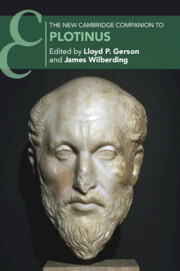Book contents
- The New Cambridge Companion to Plotinus
- Other Volumes in the Series of Cambridge Companions
- The New Cambridge Companion to Plotinus
- Copyright page
- Contents
- Figures
- Tables
- Contributors
- Acknowledgements
- Porphyry’s Arrangement of the Enneads
- Abbreviations of Other Ancient Works and Authors
- Introduction
- Part I Historical Context
- Part II Metaphysics and Epistemology
- Part III Psychology
- Part IV Natural Philosophy
- 11 Eternity and Time
- 12 Composition of Sensible Bodies
- 13 Nature: Plotinus’ Fourth Hypostasis?
- Part V Ethics
- Bibliography
- Index Locorum
- Index
- Other Volumes in the Series of Cambridge Companions (continued from page ii)
11 - Eternity and Time
from Part IV - Natural Philosophy
Published online by Cambridge University Press: 25 May 2022
- The New Cambridge Companion to Plotinus
- Other Volumes in the Series of Cambridge Companions
- The New Cambridge Companion to Plotinus
- Copyright page
- Contents
- Figures
- Tables
- Contributors
- Acknowledgements
- Porphyry’s Arrangement of the Enneads
- Abbreviations of Other Ancient Works and Authors
- Introduction
- Part I Historical Context
- Part II Metaphysics and Epistemology
- Part III Psychology
- Part IV Natural Philosophy
- 11 Eternity and Time
- 12 Composition of Sensible Bodies
- 13 Nature: Plotinus’ Fourth Hypostasis?
- Part V Ethics
- Bibliography
- Index Locorum
- Index
- Other Volumes in the Series of Cambridge Companions (continued from page ii)
Summary
Plotinus focuses on eternity (aiôn) and time (khronos) in treatise 3.7 On Eternity and Time.1 His views are rooted in the earlier tradition and are developed through an interpretation of both Plato (in particular the Timaeus) and Aristotle (in particular Physics 4). Yet Plotinus does not merely resume what had previously been stated by his authorities; his exegetical approach is based on the presentation of distinctive views that are connected to Plotinus’ metaphysical outlook, in particular to his theory of intelligible principles. Plotinus’ discussion of eternity and time is actually centred on (1) the notion of eternity as the lack of duration and extension in time (so Plotinus distinguishes eternity from everlastingness), (2) the idea that time is associated with the activity of the soul rather than with the movement of bodies, (3) the notion of ‘life’ as a mode of being that characterizes, in different ways, both the Intellect and the soul and accounts for the nature of eternity and time as well as for the derivation of time from eternity.
Information
- Type
- Chapter
- Information
- The New Cambridge Companion to Plotinus , pp. 267 - 288Publisher: Cambridge University PressPrint publication year: 2022
Accessibility standard: Unknown
Why this information is here
This section outlines the accessibility features of this content - including support for screen readers, full keyboard navigation and high-contrast display options. This may not be relevant for you.Accessibility Information
- 2
- Cited by
